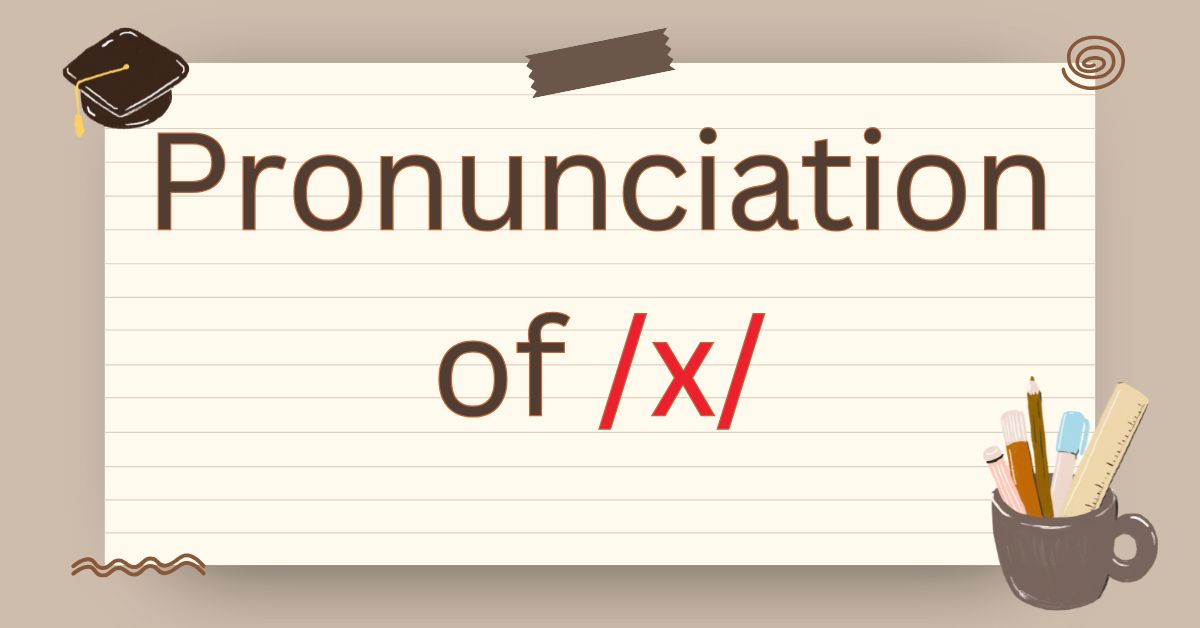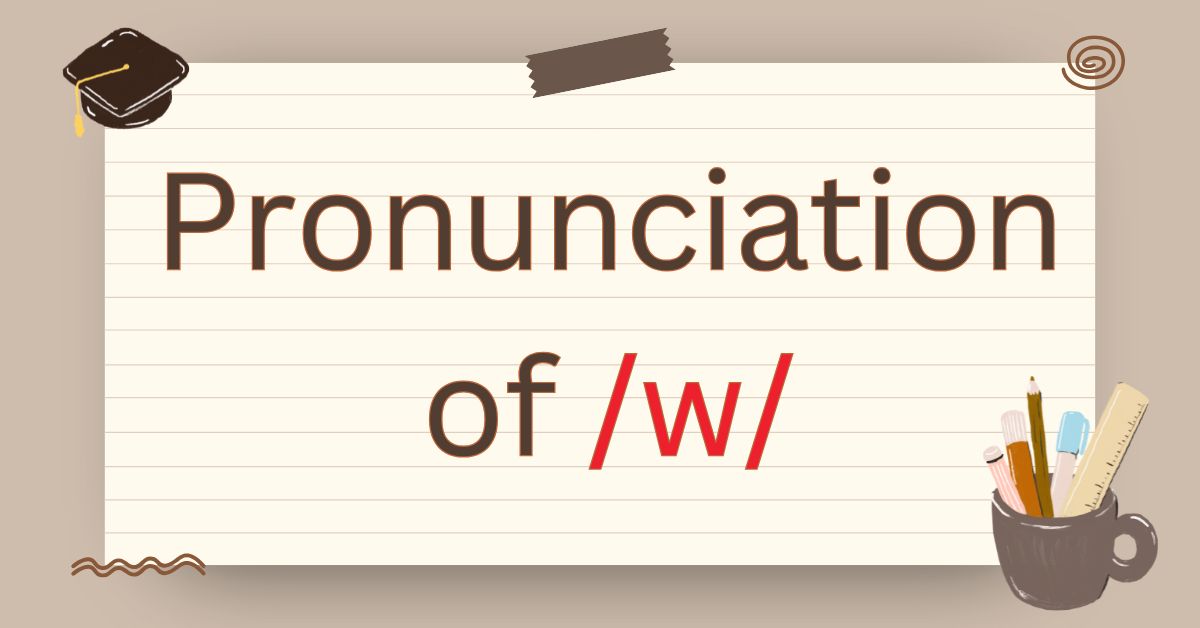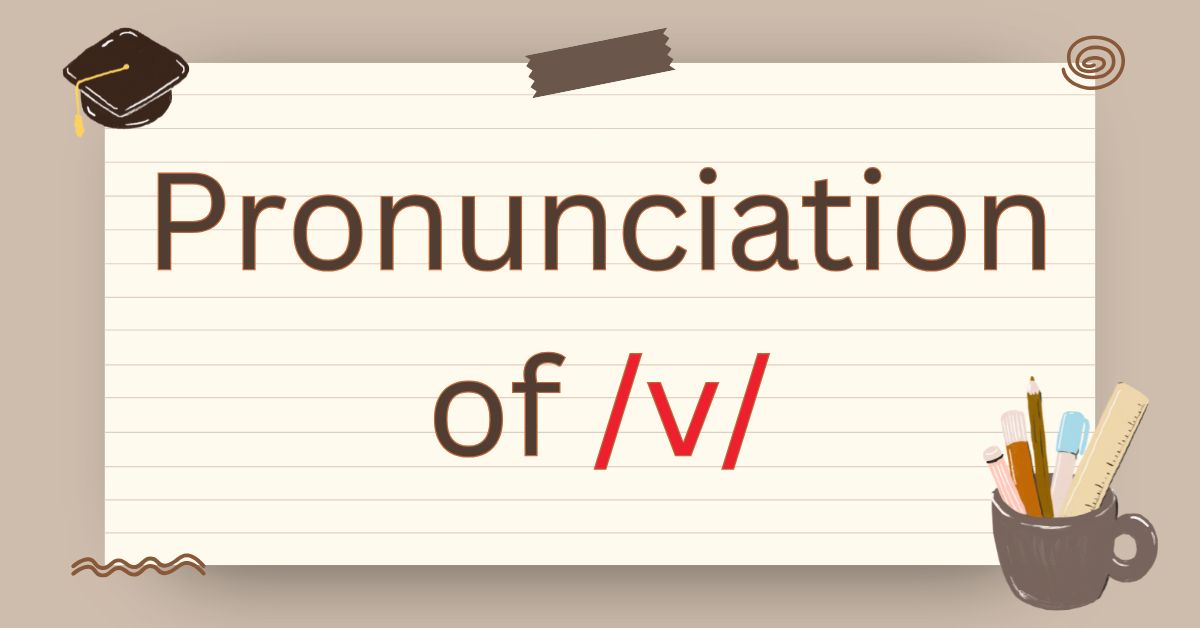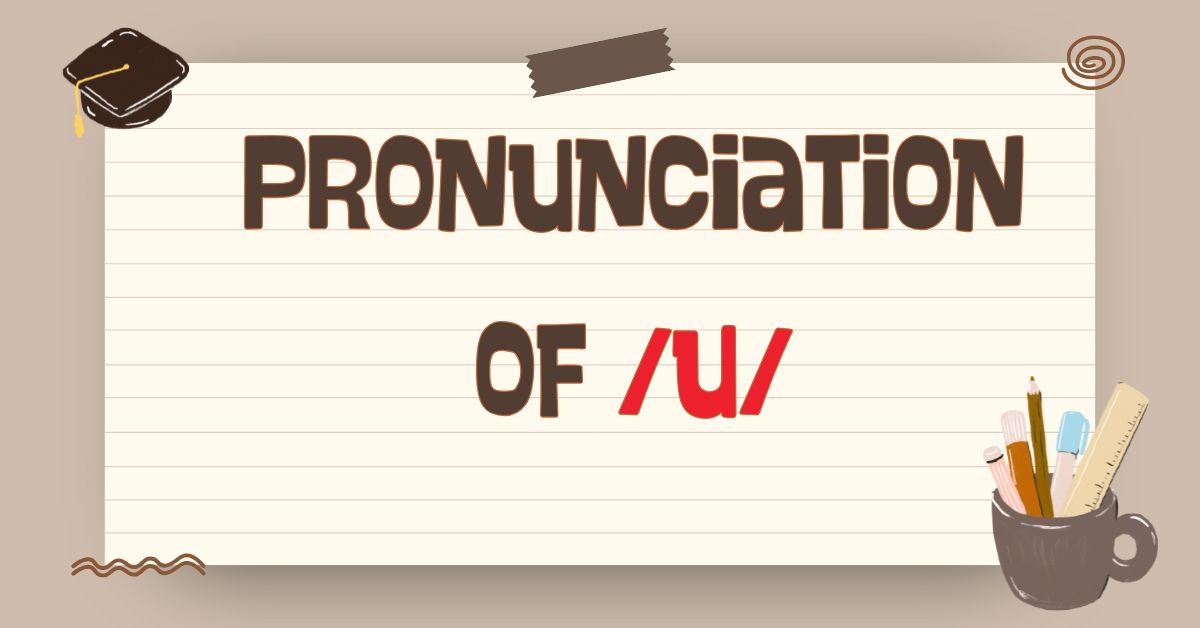คำเชื่อมในภาษาอังกฤษ (Conjunction) คือคำที่มีบทบาทสำคัญ ช่วยเชื่อมโยงกลุ่มคำ, ประโยคย่อย หรือประโยคต่างๆ เข้าด้วยกันเพื่อให้เกิดความสอดคล้องกัน, แน่นหนา และมีเหตุผล แต่จะใช้คำเชื่อมอย่างไรให้ถูกต้อง? ในบทความนี้, Monkey จะช่วยคุณทบทวนวิธีการใช้คำเชื่อมในภาษาอังกฤษอย่างละเอียด.
คำเชื่อมคืออะไร?
คำเชื่อม (Conjunction) คือคำที่ใช้เชื่อมสองคำ, กลุ่มคำ หรือประโยคเข้าด้วยกัน เพื่อให้ประโยคมีความเชื่อมโยงและมีเหตุผล นอกจากนี้ ผู้เขียนยังสามารถใช้คำเชื่อมเพื่อเน้นความสัมพันธ์เชิงตรงข้าม, การเปรียบเทียบ หรือสาเหตุผล เพื่อทำให้เนื้อหาของงานเขียนดูน่าสนใจมากขึ้น
ตัวอย่าง:
-
Do you prefer pizza or salad? (คุณชอบพิซซ่าหรือสลัดมากกว่ากัน?)
-
I can’t afford to go to the movies until next month. (ฉันไม่สามารถไปดูหนังได้จนกว่าจะถึงเดือนหน้า.)
-
I like school, but I don’t like math class. (ฉันชอบไปโรงเรียน แต่ไม่ชอบเรียนคณิตศาสตร์.)
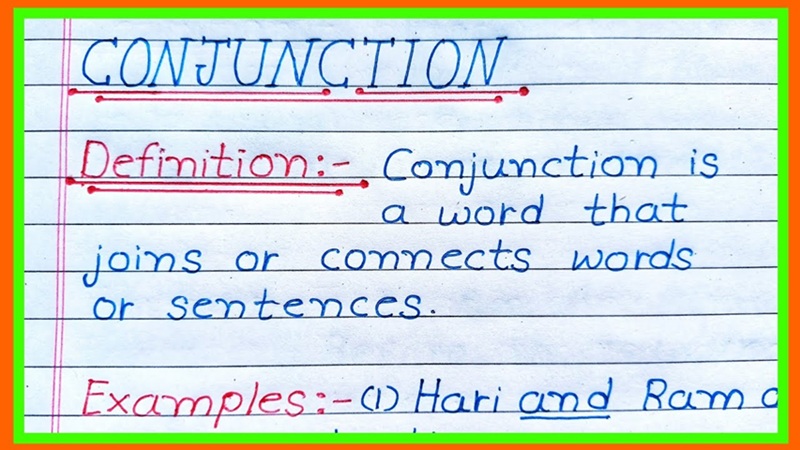
การจำแนกประเภทคำเชื่อมในภาษาอังกฤษ
ในภาษาอังกฤษ, คำเชื่อมแบ่งออกเป็นสามประเภทหลัก ได้แก่: คำเชื่อมคู่ขนาน, คำเชื่อมย่อย และคำเชื่อมร่วม
คำเชื่อมร่วม (Coordinating Conjunctions)
คำเชื่อมร่วมคือคำที่ใช้เชื่อมสองหน่วยคำ (หรือมากกว่า) ที่มีลักษณะเหมือนกัน เช่น การเชื่อมคำคุณศัพท์กับคำคุณศัพท์, คำนามกับคำนาม หรือประโยคกับประโยคอื่น
ในภาษาอังกฤษมีคำเชื่อมร่วม 7 คำ ซึ่งคุณสามารถจำคำเชื่อมเหล่านี้ได้ผ่านคำว่า FANBOYS (F – For, A – and, N – nor, B – but, O – or, Y – yet, S – so)
|
คำเชื่อมร่วม |
วิธีการใช้ |
ตัวอย่าง |
|
F – For |
ใช้เพื่ออธิบายเหตุผลหรือจุดประสงค์ของเหตุการณ์หนึ่ง |
I go to a fitness center every day, for I want to keep fit. |
|
A – And |
ใช้เพื่อเพิ่มหรือต่อเติมความหมาย |
Slow and steady wins the race. |
|
N – Nor |
ใช้เพื่อเพิ่มความหมายเชิงปฏิเสธสำหรับสิ่งที่ปฏิเสธไว้ก่อนหน้านี้ |
Trust not a new friend nor an old enemy. |
|
B – But |
ใช้เพื่อแสดงความขัดแย้งหรือตรงข้าม |
I wanted to go out, but it started raining heavily. |
|
O – Or |
ใช้เพื่อเสนอทางเลือกเพิ่มเติม |
Respect yourself, or no one else will respect you. |
|
Y – Yet |
ใช้เพื่อแสดงความขัดแย้งกับประโยคก่อนหน้า (คล้ายกับ “but”) |
The weather was terrible, yet we decided to go camping. |
|
S – So |
ใช้เพื่อบอกผลลัพธ์หรือผลกระทบของเหตุการณ์ที่กล่าวถึงก่อนหน้านี้ |
As we sow, so shall we reap. |
กฎการใช้เครื่องหมายจุลภาคกับคำเชื่อมร่วม:
- หากคำเชื่อมร่วมใช้เชื่อมประโยคอิสระ (ประโยคที่สามารถยืนเองได้เหมือนกับประโยคเต็ม) ต้องใช้เครื่องหมายจุลภาค (,) ระหว่างสองประโยค
ตัวอย่าง: I took a comic with me on my day off, yet I didn’t read a single page. - หากคำเชื่อมใช้เชื่อมระหว่างกลุ่มคำ (ประโยคไม่สมบูรณ์) หรือคำ (เช่นในรายการ) จะไม่ต้องใช้เครื่องหมายจุลภาค (,)
ตัวอย่าง: My mother does morning exercise every day to keep fit and relax. - เมื่อทำการระบุคำสามคำหรือมากกว่า, ให้ใช้เครื่องหมายจุลภาคระหว่างคำแต่ละคำ ก่อนคำสุดท้ายอาจใช้หรือไม่ใช้เครื่องหมายจุลภาคก็ได้
ตัวอย่าง: Many fruits are good for your eyes, such as carrots, oranges, tomatoes (,) and mango.
คำเชื่อมคู่สัมพันธ์ (Correlative Conjunctions)
คำเชื่อมคู่สัมพันธ์เป็นคำเชื่อมประเภทหนึ่งที่สามารถจับคู่กับคำอื่นเพื่อสร้างเป็นคู่คำ เพื่อเชื่อมกลุ่มคำหรือประโยคที่มีหน้าที่ทางไวยากรณ์เหมือนกัน
มีคำเชื่อมบางคำในภาษาอังกฤษที่สามารถจับคู่กับคำอื่นเพื่อสร้างเป็นคู่ได้ เช่น:
|
คำเชื่อมคู่สัมพันธ์ |
การใช้งาน |
ตัวอย่าง |
|
Not only … but also |
แสดงการเลือกสองสิ่ง (ไม่เพียงแต่สิ่งนี้ แต่ยังรวมถึงสิ่งนั้นด้วย) |
Love is not only a sentiment but also an art. |
|
Both … and |
แสดงการเลือกทั้งสองสิ่ง: ทั้งสิ่งนี้และสิ่งนั้น |
The company deals in both hardware and software. |
|
As … as |
การเปรียบเทียบเท่ากัน: เท่ากัน, เหมือนกัน |
Jack is as good as his master. |
|
Either … or |
แสดงการเลือก: อย่างใดอย่างหนึ่ง |
Either win the horse or lose the saddle. |
|
Neither … nor |
แสดงการปฏิเสธสองอย่าง: ไม่ทั้งสิ่งนี้และสิ่งนั้น |
I am neither interested in art nor sports. |
|
Whether … or |
แสดงการสงสัยหรือความไม่แน่ใจระหว่างสองสิ่ง |
Whether you fail or fly, at least you tried. |
|
Hardly/Scarcely … when / No sooner … than |
แสดงความสัมพันธ์ด้านเวลา: ทันทีที่ |
Scarcely had Gemi arrived when the trouble started. |
|
Rather … than |
แสดงการเลือก: มากกว่าที่จะ..., แทนที่จะ... |
I prefer starting early rather than leaving things to the last minute. |
|
So/such … that |
แสดงความสัมพันธ์เชิงเหตุและผล: จนกระทั่ง..., มากจน... |
It was such nice weather that we went sightseeing. |
กฎการใช้เครื่องหมายจุลภาคกับคำเชื่อมคู่สัมพันธ์:
สำหรับโครงสร้าง neither…nor และ either…or: กริยาจะผันตามประธานที่อยู่ใกล้ที่สุดกับกริยา.
ตัวอย่าง: My girlfriend likes neither coffee nor tea.
สำหรับโครงสร้าง both…and และ not only … but also กริยาจะผันตามประธานรวม (คือ นามทั้งสองตัวก่อนหน้า).
ตัวอย่าง: She wants to buy both this shirt and dress.
คำเชื่อมประเภทลูก (Subordinating Conjunctions)
คำเชื่อมประเภทลูกคือคำเชื่อมที่ใช้ขึ้นต้นประโยคย่อย เพื่อเชื่อมโยงระหว่าง ประโยคหลัก (main clause) และ ประโยคย่อย (subordinate clause) เข้าด้วยกัน
ในประโยคหนึ่ง ๆ ประโยคย่อยอาจจะวางไว้ด้านหน้าหรือด้านหลังประโยคหลักก็ได้ แต่ต้องเริ่มต้นด้วยคำเชื่อมประเภทลูก
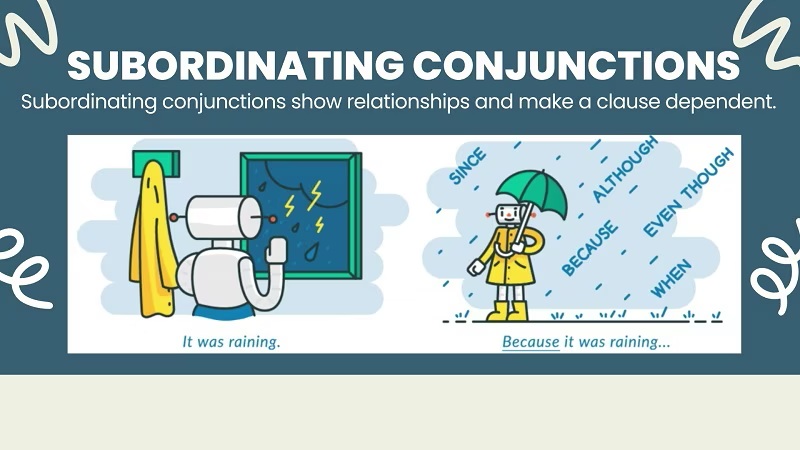
คำเชื่อมแสดงเวลาและสถานที่
|
คำเชื่อม |
ตัวอย่างประโยค |
|
After |
Fish and guests smell after three days. |
|
Before |
Don't try to walk before you can crawl. |
|
Since |
The rain has been continuous since this morning. |
|
Until / Till |
Don't whistle until you are out of the wood. |
|
By the time |
By the time she was eight, she could read Greek and Latin. |
|
Wherever |
Wherever you go, whatever you do, I will be right here waiting for you. |
|
Once |
Once on shore, we pray no more. |
|
As soon as |
As soon as the bristles on your toothbrush begin to wear, throw it out. |
คำเชื่อมแสดงวิธีการ / ลักษณะ
|
คำเชื่อม |
ตัวอย่างประโยค |
|
As |
Harry is as good as his master. |
|
As if / As though |
They look as though they're heading for divorce. |
|
Like |
There is no place like home. |
|
By (means of) |
The machine is operated by means of a lever. |
คำเชื่อมแสดงผลลัพธ์
|
คำเชื่อม |
ตัวอย่างประโยค |
|
So (that) |
I stepped aside so that she might come in. |
|
Therefore |
He was busy, therefore he could not come. |
|
As a result (of) |
Her reputation suffered a mortal blow as a result of the scandal. |
|
Consequently |
Consequently, many countries prefer alternative policies. |
คำเชื่อมแสดงเงื่อนไข
|
คำเชื่อม |
ตัวอย่างประโยค |
|
If |
If it rains, we will stay indoors. |
|
Unless |
Unless a check is signed, it is invalid. |
|
Provided that |
The agreement provided that the two sides should meet once a month. |
|
As long as |
As long as they read, short but fickle. |
คำเชื่อมแสดงการเปรียบเทียบ
|
คำเชื่อม |
ตัวอย่างประโยค |
|
As … as |
Hatred is blind as well as love. |
|
Than |
False friends are worse than open enemies. |
|
Like |
Genius without education is like silver in the mine. |
แบบฝึกหัดการใช้คำเชื่อม
แบบฝึกหัดที่ 1: เติมคำเชื่อมให้เหมาะสม
(เติมคำเชื่อมลงในช่องว่าง: and, but, or, so, because, although, if, when, since, unless)
-
I stayed at home ___ it rained heavily.
(ฉันอยู่บ้าน ___ ฝนตกหนัก) -
She is very tired, ___ she keeps working.
(เธอเหนื่อยมาก ___ เธอยังทำงานต่อ) -
He can speak English ___ French.
(เขาพูดได้ทั้งภาษาอังกฤษ ___ ภาษาฝรั่งเศส) -
We were late ___ the traffic was bad.
(พวกเรามาสาย ___ การจราจรติดขัด) -
You should eat more fruit ___ vegetables.
(คุณควรกินผลไม้มากขึ้น ___ ผักด้วย) -
I won’t go ___ it stops raining.
(ฉันจะไม่ออกไป ___ ฝนยังไม่หยุด) -
We couldn’t play football ___ it was raining.
(พวกเราเล่นฟุตบอลไม่ได้ ___ ฝนกำลังตก) -
I don’t like coffee, ___ I like tea.
(ฉันไม่ชอบกาแฟ ___ แต่ฉันชอบชา) -
You can have cake ___ ice cream.
(คุณสามารถกินเค้ก ___ ไอศกรีมก็ได้) -
She was reading a book ___ I arrived.
(เธอกำลังอ่านหนังสืออยู่ ___ ตอนฉันมาถึง)
คำตอบ:
-
because
-
but
-
and
-
because
-
and
-
unless
-
because
-
but
-
or
-
when
แบบฝึกหัดที่ 2: เลือกคำเชื่อมที่ถูกต้อง
(เลือกคำเชื่อมที่เหมาะสมจากในวงเล็บ)
-
I will call you (and / or) send you an email.
(ฉันจะโทรหาคุณ ___ ส่งอีเมลไปให้ด้วย) -
She was very hungry (but / because) she didn’t eat anything.
(เธอหิวมาก ___ เพราะเธอไม่ได้กินอะไรเลย) -
We stayed at home (because / although) it was raining.
(เราพักอยู่บ้าน ___ เพราะฝนตก) -
I didn’t go out (because / so) I was tired.
(ฉันไม่ออกไป ___ เพราะฉันเหนื่อย) -
We were late (because / so) the traffic was bad.
(เรามาสาย ___ การจราจรติดขัด) -
He likes both cats (and / or) dogs.
(เขาชอบทั้งแมว ___ สุนัข) -
You can go to the party (if / unless) you finish your homework.
(คุณสามารถไปงานปาร์ตี้ได้ ___ ถ้าคุณทำการบ้านเสร็จ) -
(Although / Because) she was ill, she went to school.
(___ เธอป่วย เธอก็ยังไปโรงเรียน) -
He doesn’t smoke (and / but) he drinks a lot.
(เขาไม่สูบบุหรี่ ___ แต่เขาดื่มหนัก) -
We missed the bus, (so / because) we had to walk.
(เราพลาดรถเมล์ ___ เราจึงต้องเดิน)
คำตอบ:
-
and
-
but
-
because
-
because
-
because
-
and
-
if
-
Although
-
but
-
so
แบบฝึกหัดที่ 3: แก้ไขข้อผิดพลาดเกี่ยวกับคำเชื่อม
(แต่ละประโยคมีคำเชื่อมผิด 1 จุด ให้ขีดเส้นใต้แล้วแก้ให้ถูกต้อง)
-
I was tired, because I went to bed late.
-
She studied hard, but she passed the exam.
-
He can speak English, or he can’t write it well.
-
We stayed at home, so it was raining.
-
Although he is rich, and he is not happy.
-
She was sad, because she won the prize.
-
I like apples, but I like bananas too.
-
I will go shopping, unless I finish my work.
-
They went to the beach, because the weather was nice.
-
He was late, so he missed the bus.
คำตอบ:
|
ประโยคเดิม |
แก้เป็น |
|
because → so |
I was tired, so I went to bed late. |
|
but → and |
She studied hard, and she passed the exam. |
|
or → but |
He can speak English, but he can’t write it well. |
|
so → because |
We stayed at home because it was raining. |
|
and → (ลบออก) |
Although he is rich, he is not happy. |
|
because → although |
She was sad although she won the prize. |
|
but → and |
I like apples, and I like bananas too. |
|
unless → if |
I will go shopping if I finish my work. |
|
because → so |
They went to the beach, so the weather was nice. |
|
so → because |
He was late because he missed the bus. |
บทสรุป
ในบทความนี้ Monkey ได้รวบรวมความรู้ที่จำเป็นเกี่ยวกับคำเชื่อมและวิธีการใช้คำเชื่อมในภาษาอังกฤษ หวังว่าความรู้นี้จะช่วยให้คุณเข้าใจวิธีการใช้คำเชื่อมในสถานการณ์ต่าง ๆ ได้ดีขึ้น ขอให้คุณมีความสนุกสนานและความมุ่งมั่นในการเรียนภาษาอังกฤษเสมอ



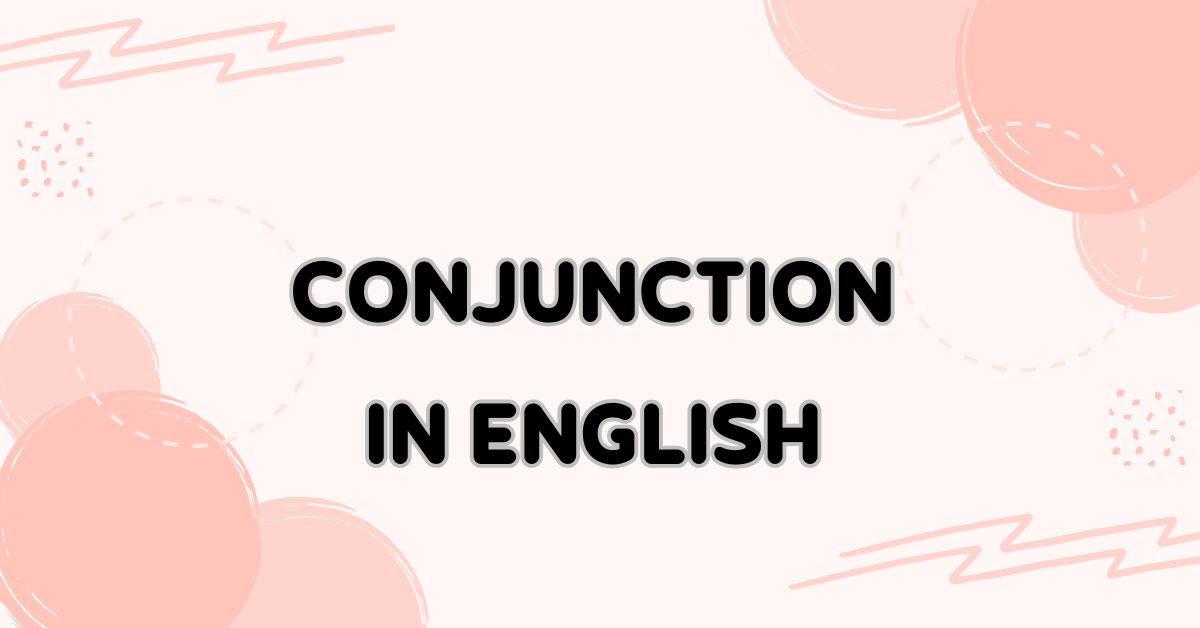
.png)
